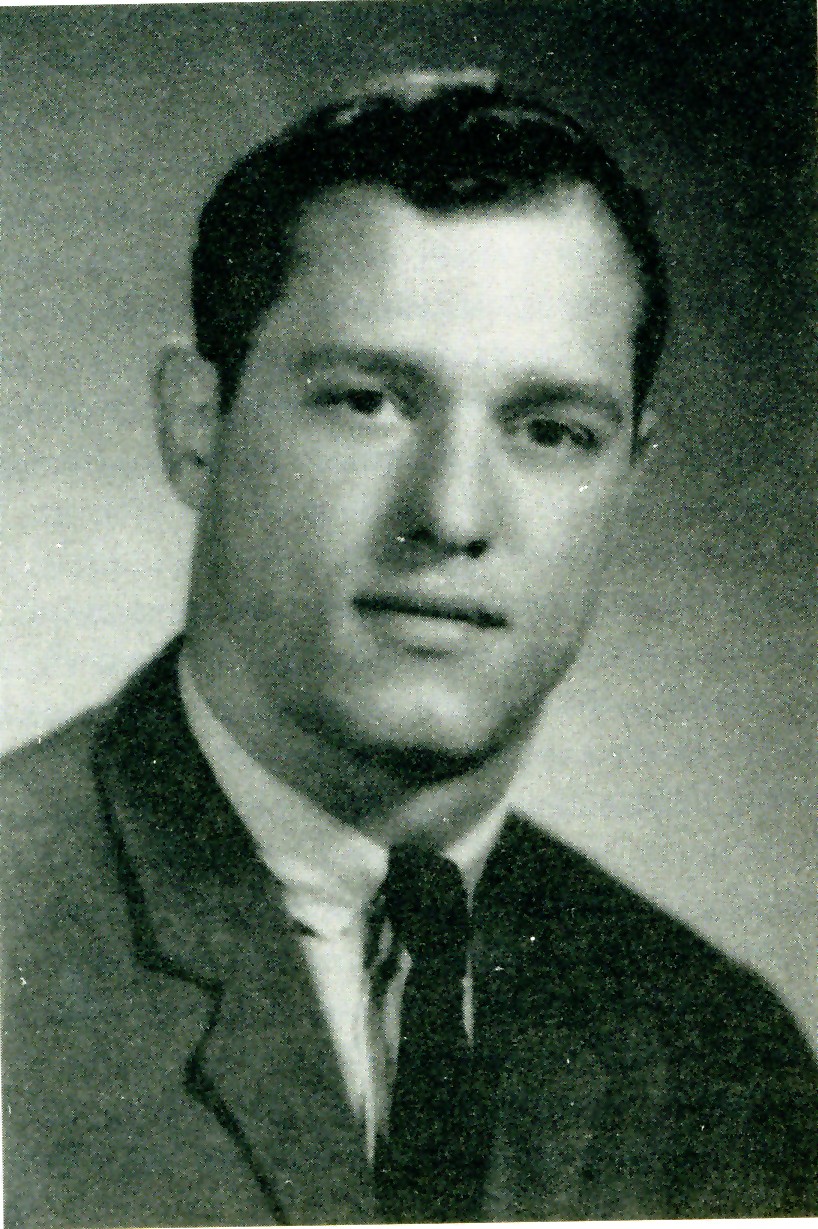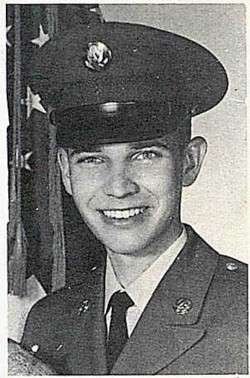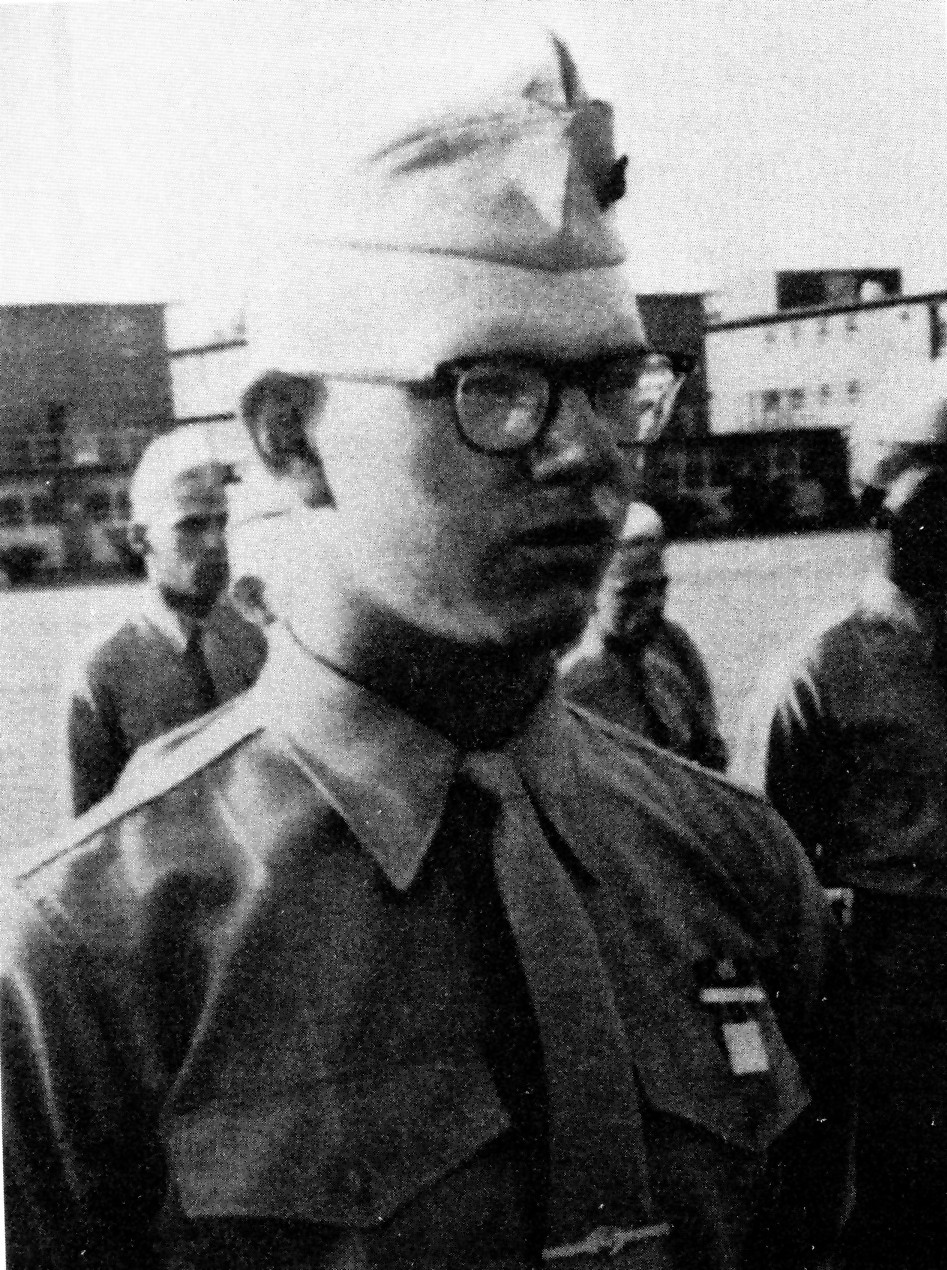
GEORGE C SCHOETTNER - SP4
- HOMETOWN:
- pitman
- COUNTY:
- Gloucester
- DATE OF BIRTH:
- February 13, 1946
- DATE OF CASUALTY:
- August 03, 1969
- BRANCH OF SERVICE:
- Army
- RANK:
- SP4
- STATUS:
- KIA
- COUNTRY:
- South Vietnam
Biography
George C. Schoettner was born on February 13, 1946. His home of record is Pitman, NJ. He had one brother, David.
He served in the US Army and attained the rank of Specialist 4 (SP4).
Schoettner was killed in action on August 3, 1969. He was survived by his wife, Penelope.
Craig
February 13, 1946-August 3, 1969
SP4, Army Pitman, NJ
SP4, Army Pitman, NJ
As a freshman, he started for the Trenton State football team at tackle. He had been selected for numerous all-star teams while attending Pitman High School and was named the best lineman in Gloucester County by the Woodbury Times in 1963. And he was as at home with his partner on the gymnastic dance floor as he was on the gridiron. He also held a brown belt in Judo and taught swimming. He stood a well-built six feet tall, had light brown hair and blue eyes.
Craig Schoettner expected to be a teacher, a husband and a father; he also aspired to be a professional football player. He liked to perform but preferred instructing others. He was going to be good at whatever he did; he had already proven that. He made his own way and his own decisions. But about the last thing he expected to be was a good soldier.
Craig and his twin brother, David, were adopted by George and Anne Schoettner in 1946. George was a career Navy man, a World War II veteran and in 1951 was transferred to the Philadelphia Recruiting office. The boys were four when George moved his family from California to Pitman, NJ. He retired from the Navy in 1958 and spent ten years as a postman with the Pitman Post Office.
"Craig was a very pleasant person to be around," his father recalled. "He had a good-humored smile and was an all around good and happy person."
"Both of us were dreamers," says David, now living in Newfield, NJ. "Craig was more gregarious. He loved people. He liked to be involved with other people's lives."
In the early sixties, Craig and David were lifeguards at popular Clear Streams, later named Senior Lakes, in Glassboro. They were also members of the swim team. Craig had seen a show on television consisting of funny antics and clowning around on diving boards.
"My brother got others from the swim team enthused and from memory, reproduced the show almost identical to the one on TV," David says. "It drew raves from all the people at the lake. It was quite a hit."
"He enjoyed all sports immensely," David continues. "He liked baseball but his passion was football. I watched his games, and you could see how he would cause mayhem in the other team's offense. He got a lot of sacks. He could detect the flow of the play instantly. I think he could have made his way in the professional ranks."
Pat Case (nee Glass), now of Vernon Hills, Illinois, remembers her sophomore year at Pitman High. "Craig was dating a friend of mine, and somehow we ended up going steady for the next two years," she says. "I remember the good times we had. You know, the usual boyfriend/girlfriend memories. The laughs and some tears, the dances, the movies' and the football games. He was a tackle, and I carried the American flag in the color guard. I remember hiding out with him under a stairwell and getting caught by the Vice Principal."
"Craig could have been an honor student, if he had set his mind to it. He had an outstanding vocabulary and a fantastic memory. He could remember things the first time around which, to him, meant he didn't have to study as much."
"He was a favorite of my coach and physical education teacher, Mrs. Chiomento. Every year, she would put together a Sports Night program where all the girls had to participate and were graded for their performance. They were divided into two teams by school colors and competed against each other. The program included dancing; Mrs. Chiomento was always looking for guys who would help, and Craig was always there. He lifted the lead dancer in the theme song for several years because he was so strong. He really liked doing that. He liked being a part of something. He was also my partner in the Senior ballroom dance, which was another part of the program."
"We were both athletic. Our friends always thought we'd both go to college, become physical education teachers, and then return to get married," Pat continues. "Well, we went to different colleges, and we both were married in 1967, but to different people. We always said we would come back to a class reunion just to see how the other was doing."
Craig graduated from Pitman High in June of 1964. He was accepted at Trenton State College where he became a physical education major. He spent the summers swimming at the lake and working at Glassboro Cold Storage. He even spent some time being a bouncer at the Cedarwood Bar and Grill in Malaga, NJ.
David doubts his brother's calling was in the classroom. "He was more of an instructor than a teacher," he says. "He had the ability to get people involved and to entertain. He really did enjoy people."
Penny Maffei of Hamilton, NJ, was an elementary education major at Trenton State in the fall of 1965. She and Craig were sophomores when they met.
"Craig was not a particularly good student. It wasn't that he didn't have the intelligence; he just didn't like to study. He was an excellent athlete and would have preferred teaching physical things as opposed to classroom work," she says. "Being a physical education teacher would have been perfect for him because he liked working with kids."
Penny and Craig quickly became a couple, and, in April of 1967, they were married. "We planned to get jobs in the same school system after graduation and have careers in teaching," Penny says. "That was about as far ahead as we talked, except having children sometime. I think we both had similar views of what our future was to be like."
"We both had part-time jobs during the school year and in the summer. We weren't from wealthy families and had to earn our own spending money to help with expenses. Any free time we had, we tried to spend together. Mostly we went to movies, took walks or watched television. Money was in short supply. Craig enjoyed Judo and taught a class at Trenton State and also did demonstrations. But his favorite between-class activity was playing cards in the Student Union."
Penny graduated in June of 1968; Craig was still a few credits short of requirements. Penny found a job teaching second grade at Kuser School, and the couple moved into an apartment in Hamilton Township. Craig was fully aware of the draft and decided to take his chances. But by October, he was headed to Fort Dix, NJ.
"He didn't want to go into the service, but, since he was drafted, he didn't have a choice," Penny continues. "I don't think he liked all of the rules and restrictions of Army life, but he was a good soldier and did whatever was expected of him."
David also recalls Craig's acceptance of his duty. "He would not shirk responsibility. He wouldn't use any advantage he had as a means to avoid what was expected of everyone else. But he would stand up for his rights and not let anyone take advantage of him."
After basic training at Fort Dix, Craig was sent to advanced infantry school at Fort Polk, Lousiana. He developed an interest in becoming an officer and was accepted into Officer Candidate School at Fort Benning, Georgia.
"It was at Fort Benning that something happened," Penny says. "An incident occurred in April which caused Craig to leave officer's training. He wrote to me in a letter postmarked April 11th that - 'This place is getting me down. There is so much bullshit going on that nobody knows what's going on. Not only that, it seems to get worse as we go along.' Then on April 22nd, he wrote to me that he was leaving the course. The reason was that he 'didn't want to be responsible for people's lives.' I wish I could recall what exactly had happened. I hesitate to speculate since I don't have the actual facts. I do know that Craig was not one to sit by and see an injustice being done to anyone. He would not have left the course unless there was a very good reason and he felt justified in that decision. I think he was more comfortable being a part of a unit as opposed to being in charge of it. I'm not sure why because he had great leadership ability."
By the middle of June 1969, Craig was on his way to Vietnam. He was assigned to the Combat Support Company, 2nd Battalion, 16th Infantry, 1st Infantry Division. The unit operated about thirty miles southeast of Saigon.
"We never actually discussed the 'rightness' of the war," Penny recalls. "When he was drafted, he felt it was his duty to serve. I would have done anything I could to keep him from having to go to Vietnam, but he wanted to go and do his part. And of course, being twenty-three, he had that feeling of being invincible. However, that changed once he got there. He was well aware that there was constant danger but I know he felt he was prepared to handle anything and survive... and I believed in him."
On August 3rd, barely six weeks into Craig's twelve-month tour, his platoon was in a daylight ambush position near Lai Khe. At 3:10 P.M., a firefight with the Viet Cong broke out, and a hand grenade claimed Craig's life.
His unit commander sent a letter to George Schoettner dated August 26th. In part, it read:
During the time that I have commanded the company, I have come to know your son as an outstanding soldier. He could always be depended upon to do his job and to do it well. He was a definite asset to his platoon and company.... You can be proud of your son.
The news of Craig's death was devastating to his family and to the town of Pitman. He was the fifth young man from the tiny borough to give his life in Vietnam. In a memorial service held at Kelley Funeral Home in Pitman, George Schoettner read a story:
My sons and I used to walk along a brook beside the road. Along the way, they would gather up stones to throw in the water, watching them disappear beneath the surface. One day, one of my boys pointed to the ripples left by a stone and asked: "Where did it go, Daddy? Is it gone?" It seemed to have become lost amidst the other stones at the bottom. But, even in the moving water, the ripples were still visible in the brook.
A son is born into a family. He grows up, becomes a brother, a friend, a teammate, a husband. All too soon, it seems he is gone from this life. And we ask: Where did he go so soon? Why did he have to die so young? What remains of this vibrant life?
In moments like this, our faith replies: He is with God, in a place or state prepared for him long ago. What he gave to life lives on, and the streams of life will always be different because he was there.
Penny shares her feelings of the time. "I never thought he would not come home. He was the first man I ever loved, and I had built my world around our future. I then found myself in a situation of living by myself with bills to pay, and I knew I had responsibilities to meet. I didn't think about anything except getting through each day. And I cried a lot. It was hard to go back to school and face a room full of seven-year olds when I felt so terrible. I think the worse thing was not being able to see him and say goodbye. Even to this day, I feel that there should have been something I could have done to protect him."
"I was married and living in Monterey, California, where my husband was stationed at Fort Ord when I learned of Craig's death," says Pat Case. "My husband was working with 'shell-shocked' Vietnam returnees, and we lost some other friends in the war. You prayed for everyone to return and were excited to hear when they did...and felt incredible sadness when they didn't. Like many others, I am still angry about this war in Vietnam. It wasn't our war. We lost a lot of young, innocent men who had so much to give."
Penny Maffei recalls her continuing pain and an unanswered question. "Sometimes I have dreams that are so real that I feel he is still here with me. And like all the other wives who were in my situation, I still want to know why he had to die. Craig had a lot to give. He was very loyal to the people he loved. He had a great sense of humor and loved life. And if he accepted a responsibility, he would fulfill it to the best of his ability. He did his very best for his country and his fellow soldiers."
David Schoettner reflects on his loss and has his own question. "It was a very traumatic time for me," he says. "I cried during the whole funeral service. A brother is impossible to replace. I want Craig to be remembered as a young man very high on the future. He knew there was a lot more to life than learning. Much of his life was geared around teaching. He was an all around person, very entertaining and athletic. But his life was cut much too short...and for what purpose?"
Before George Schoettner passed away thirty years to the day after Craig's death, he remembered the impact of his son's life and refused to look at his death as a waste. "He was a good American, a good husband and a good son. We are so proud that he fought for his country and did not rush off to Canada, as many did."
Of course he hadn't, because, in addition to everything else Craig Schoettner was, he was a good soldier.
Excerpt from They Were Ours: Gloucester County's Loss in Vietnam
by John Campbell
Used with permission of author
Sources: John Campbell and NJVVMF.
Remembrances
Be the first to add a remembrance for GEORGE C SCHOETTNER
Help preserve the legacy of this hero, learn about The Education Center.
LEARN MORE

